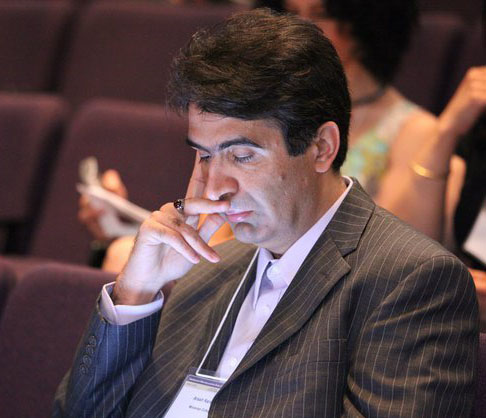Source: iranwire.com
Translation By Iran Press Watch
17 November 2015
The arrests of 20 Baha’i citizens in Tehran, Isfahan and Shiraz and the closing of 23 Baha’i-owned businesses in Mazandaran Province is evidence of continued pressure on Baha’is by the Islamic Republic.
To date, the Islamic Republic of Iran has repeatedly declared through the national media, as well as its representatives to the Human Rights Council, that restrictions on Baha’is are due to their proselytizing and provocation of Iranian Shia sensitivities.
A representative of the Islamic Republic has openly stated, “If a Baha’i practices his religion for himself, does not invite others to join his faith, does not participate in Baha’i activities or meetings, does not disseminate information to others and is not involved in administrative activities, we are not concerned with him. We will not arrest him, let alone execute him.”
In a similar statement in June 2011, Mohammad Javad Larijani, Head of the Human Rights Council of the Judiciary, declared, “As long as Baha’is respect the laws and regulations, no one will interfere with them. Many Baha’is engage in social, economic and scientific activities, but they are not allowed to propagate their faith.”
The International Covenant on Civil and Political Rights (ICCPR) confirms the right to freedom of thought, conscience and religion in its Article 18.1: “Everyone shall have the right to freedom of thought, conscience and religion. This right shall include freedom to have or to adopt a religion or belief of his choice, and freedom, either individually or in community with others and in public or private, to manifest his religion or belief in worship, observance, practice and teaching.”
Limitations to freedom of religion or beliefs are similar to those pertaining to freedom of speech. Article 18.3 of the Covenant states, “Freedom to manifest one’s religion or beliefs may be subject only to such limitations as are prescribed by law and are necessary to protect public safety, order, health, or morals or the fundamental rights and freedoms of others.”
Another limitation on the right to teach one’s religion is coercion. General Comment No. 22, Article 18 of the ICCPR explains coercion as “the use of threat of physical force or penal sanctions to compel believers or non-believers to adhere to their religious beliefs and congregations, to recant their religion or belief or to convert.” Policies or practices having the same intention or effect, such as, for example, those restricting access to education, medical care, employment or the rights guaranteed by article 25 and other provisions of the Covenant, are similarly inconsistent with article 18.2.
Regarding the Islamic Republic’s claims, Baha’i community spokesperson, Padideh Sabeti, states, “Seda va Sima (Iran Broadcasting) and government sponsored media have been promoting lies and hate-mongering against Baha’is for years. They accuse Baha’is of incest, or because Baha’u’llah’s shrine is in Haifa they charge Baha’is of spying for Israel. But Baha’is are never given an opportunity to defend themselves against these allegations. That is why Baha’is have no recourse but to counter the lies and accusations widely broadcast by the regime’s media by explaining the teachings of the Baha’i Faith to individuals. The regime calls this mass teaching by Baha’is.”
Erfan Sabeti, translator and researcher in the fields of philosophy, religion and sociology states, “In order to suppress Baha’is, the regime often resorts to various excuses. For instance, in one city, the legal authorities closed down the company of a Baha’i under the pretext that he had been teaching the Baha’i Faith. The evidence provided was laughable. The ruling stated that the company had used devious methods to propagate the Baha’i Faith, namely by providing its employees with better pay and benefits compared to other companies! If an employer takes care of his employees, how is that considered teaching? On another matter, they do not allow Baha’is to be buried in cemeteries because the mere existence of a Baha’i tombstone is a kind of promotion of the Baha’i Faith.”
In response to a question regarding the right of other believers to teach their religion in Moslem communities, Iranian cleric, researcher and reformist, Hasan Yousefi Eshkevari, states, “Just as Islam teaches freedom of thought and belief and, according to the Quran, religion cannot be based on ignorance and doubts, it necessarily follows that there must be freedom to express and promote beliefs. Followers of any religion or creed must have the right to defend and teach their beliefs, because freedom of speech and teaching are concomitant with freedom of thought. You cannot say people have freedom of belief but that they are not allowed to teach their thoughts and beliefs. Furthermore, if people cannot voice their beliefs without censorship and harassment, how can we claim to believe in the independent search for truth? Do not all scholars and religious authorities assert that independent study of religions is essential? That every person must search for himself and ultimately accept a religion with complete understanding and freedom? I can also defend freedom of speech and religion based on the Universal Declaration of Human Rights. I believe this document to be the most useful and valuable instrument for the eradication of war, enmity and discrimination and to foster peace, unity, equality and justice. Since religious reformists generally deem it their duty to publish proclamations, they cannot refuse to defend freedom of speech.”
Arash Naraghi, assistant professor of religion and philosophy, states: “My opinion regarding the right of Baha’is to teach their religion is based on the philosophical-theological principle of the right to be wrong in public discourse. That is, people of all beliefs and inclinations must recognize the right of others to adhere to beliefs that they may find fallacious.” He emphasizes that, “Society must resort to common sense and through common discourse differentiate between those “fallacies” that should be tolerated and those that should not.” He adds, “The most important yardstick for distinguishing between the two is the yardstick of human rights; i.e. those beliefs that result in discrimination and violation of human rights must not be tolerated; but those that are rejected by one religious group purely based on that group’s religious teachings and beliefs usually fall under “fallacies” that should be tolerated. That means no one has the right to interfere with those believers or hinder them in the practice of their beliefs.” Naraghi stresses, “From the perspective of philosophy and theology, this is based on the first principle that the public arena is jointly owned by all citizens in a society – thus no one is better or above another. The second principle is that every individual has autonomy over his personal property. Where all citizens have an equal share in the common good they must also have an equal share in its management, and no individual is above another in this respect. Therefore, all the beneficiaries of jointly owned property play an equal and active role in the planning and administration of its affairs. The third principle is justice. Joint owners must find a just system of administration to ensure equal rights for all. Based on the justice principle, the governance of jointly owned property must not be carried out in a way that violates the rights and interests of some of the owners in a biased and systematic manner.” The professor adds, “The binding laws and policies governing a jointly owned property can only be just when they are acceptable to all owners. Therefore, the principle of justice requires that these laws and policies not be based on principles and values that are only acceptable to one particular group. In other words, the principles governing the public arena must be based on a foundation that is understood and accepted by all, regardless of their ideology (including their religious beliefs). One of the most important outcomes of this principle is that the followers of no religion have the right to create a system under which the followers of another religion are excluded from participating in the socio-political arena, or to marginalize them. Peaceful coexistence based on the principle of justice can only be achieved with the acceptance of the “other”, even though I may think he is wrong.”
Yaser Mirdamadi, researcher in philosophy and religious studies, also acknowledges the right of Baha’is to teach their faith: “If we believe that Moslems should be allowed to teach Islam in non-Moslem countries and if, according to the Golden Rule sanctioned by the Quran and Islamic tradition, we should do unto others as we would have them do unto us, we conclude that we must allow non-Moslems to teach their faith in Moslem countries.”
Regarding the accusation of proselytization as a justification for the widespread human rights abuses against Baha’is, Erfan Sabeti declares, “In Baha’i writings teaching is encouraged, but first one must teach oneself; secondly, teaching should be done through deeds not words; thirdly, they must teach social and moral Baha’i principles, such as the equality of men and women, active participation of women in all areas of society, unity of all religions, universal peace, and most important, the obsolescence of the clergy. The Islamic Republic does not like these teachings – that is why it does not allow Baha’is to participate in society, and it uses all manner of excuses to suppress them.”




November 24, 2015 8:11 pm
“provocation of Iranian Shia sensitivities” as stated in the article above is everything that a person does which does not 100% follow the beliefs of the brutal Islamic regime. Even if you are breathing the air, they accuse you of “provocation of Iranian Shia sensitivities”. That is why ISIL wants to come after the Mullah’s in Iran, because the Mullahs have provoked the Sunni/Wahhabi sensitivities.
This vicious and fanatic/ignorant cycle of hatred never ends with this type of 7th century mentality. The ignorant mentality that “If you are not one of us, then you are our enemy” is completely prevalent in the Islamic regime of Iran and its cronies (Hamas, Hezbollah, Islamic Jihad, etc).